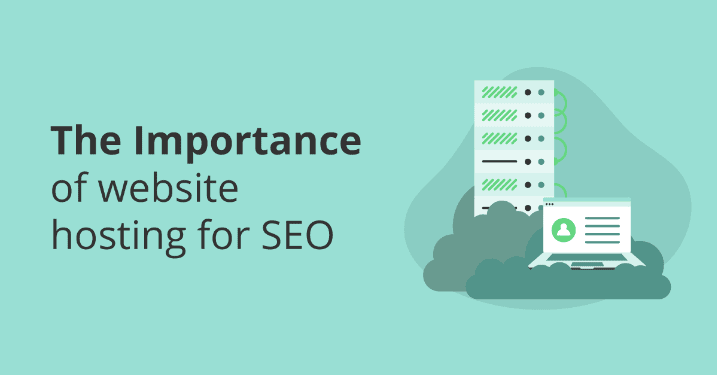Curious about a simple method to improving your website’s speed and overall performance? Consider investing in high-quality hosting.
There’s no justification for any business to opt for a low-cost web host when the significance of website performance in boosting rankings, traffic, and conversions is well-established.
This comprehensive guide will provide you with insights into the impact of Web Hosting on SEO, covering all the essential aspects you need to know.

What is Website Hosting?
A web hosting service provider, often referred to as a web host, is a service that provides the necessary technology for a website to be accessible online. Consider a web host as the central hub for your website. Websites or individual webpages are stored on specialized computers known as servers, and these servers facilitate the connection and delivery of your webpages to internet browsers.
Therefore, when users wish to visit your website, they simply need to enter your website address or domain into their browser.
While companies invest significant time and resources in the design, development, digital marketing, and SEO of their websites, web hosting is often overlooked.
If you’re willing to invest in ensuring that your website looks appealing, attracts traffic, and is optimized for search engines, why not also guarantee that the website itself is fast, functional, and flexible?
Choosing a high-quality web host can not only improve your website’s speed and functionality but also contribute to increased conversion rates and other valuable benefits.
The Advantages of Web Hosting for Businesses
To establish a website for your business, securing a web host is imperative. While web hosting often takes a backseat in the minds of business owners, it plays a critical role in shaping your online presence.
Opting for a dependable web host can yield several advantages for your company, including:
- Enhanced site performance.
- Efficient data management.
- Improved security.
- High uptime.
Making an investment in a reliable web host is a prudent decision that can contribute to the growth of your business.
Expected Features from Hosting Providers
Web hosting services for businesses consist of more than just hosting; they offer a range of services to ensure a seamless experience for business owners, allowing them to concentrate their time and energy on their core activities.
Here are some features you can anticipate from a reputable web hosting provider:
- Email accounts: Hosting providers typically facilitate the creation of domain names and offer email accounts as part of their services.
- FTP access: File Transfer Protocol (FTP) enables the seamless transfer of files from a local computer to the web server. This feature is important for web developers, allowing direct file transfers from the computer to the server, and making the website accessible on the internet.
- WordPress support: Many hosting providers recognize the prevalence of WordPress, powering a significant portion of websites. They offer support for WordPress, providing a convenient platform for creating and managing website content.
- Enhanced security: Leading hosting providers, such as Bluehost, often include free SSL certificates with their services, enhancing the security of your website.
Most Popular Web Hosts Provider
Popular web hosting companies include:
- GoDaddy
- Amazon Web Services
- Google Cloud Platform
- Bluehost
- DigitalOcean
- Liquid Web
- 1&1 IONOS
- HostGator
- Hetzner Online
- WP Engine
The Significance of Web Hosting for SEO
In the world of SEO, Google is committed to delivering optimal results for its users. Therefore, a robust and dependable web host serves as the cornerstone for effective SEO efforts.
Google evaluates various factors to ensure a positive user experience following a search. Websites that offer faster performance and an enhanced user experience stand to receive a boost in rankings.
Given the widespread emphasis on SEO in the strategies of businesses and brands today, the aspiration is to secure a position on the first page of Google for relevant search queries. Websites failing to attain this premier status on the first Page may go unnoticed, adhering to the notion that “the best place to hide a website is the second page of Google.”
Here are reasons to underscore the importance of web hosting for SEO: speed, security, and location.
How Much Does It Cost To Develop A Website For A Small Business?
Speed
Approaching it pragmatically, speed emerges as a pivotal factor in SEO. Opting for a slow and budget-friendly web host inevitably leads to a sluggish website, triggering a cascade effect of poor rankings, diminished organic traffic, and limited leads.
The remedy lies in selecting a quality web host renowned for its high speeds, thereby reducing the load time of your pages.
In the context of website loading speed in 2022, the benchmark is to aim for the fastest possible performance. Google’s standard for an ideal mobile speed is two seconds or less.
A 2022 study revealed that the average loading time for mobile sites was approximately 4.5 seconds. Notably, for 20% of the examined mobile landing pages, visual content took more than 6.6 seconds to load.
Given the correlation between speed and revenue, this lag remains unacceptably slow.
For those seeking to measure page speeds, several tools are available, including:
- Google Page Speed Insights
- GTMetrix
- Pingdom
Key metrics for website targets are provided by the Core Web Vitals report, which assesses webpage performance based on real-world usage data, also known as “field data.”
The Core Web Vitals consist of three important metrics:
- LCP (Largest Contentful Paint): Indicates the time taken to render the largest element of visible content from the moment the user requests the URL. This metric is crucial for informing users that the URL is loading.
- FID (First Input Delay): Reflects the time from the user’s interaction with the website, such as clicking on a link, to the browser’s response to the action. This metric is significant as it marks when the page becomes interactive.
- CLS (Cumulative Layout Shift): Measures the total sum of individual layout shifts throughout the page’s lifespan. Ranging from zero (no shifting) to positive numbers (indicating layout shifts), this metric is vital to user experience, preventing unexpected layout shifts during interaction with the website.
Location
The geographical location significantly influences your website’s SEO. Search engines take location-based signals into account to deliver optimal results.
Consider the following questions:
- Where is the user located?
- Where is the business situated?
- Where is the site physically located?
These practical considerations play a crucial role in determining the hosting location, affecting data travel distance and speed.
For instance, if your business operates within the United States, hosting your website in a U.S. data centre is preferable. Similarly, for a business in the United Kingdom, choosing a UK data centre is advisable.
For businesses with a global presence, opting for a Content Delivery Network (CDN) with worldwide hubs ensures fast hosting, irrespective of the user’s location.
Choosing a cheap web host may lead to your site not being placed in a local data centre. This has the potential to negatively impact your website’s performance for users and its organic search rankings.
Security
In the absence of a robust security system for your website, it becomes vulnerable to detrimental issues such as hacking, spam pages, and fake backlinks.
These issues have the potential to inflict harm on your Google rankings, possibly leading to manual actions against your site. Additionally, there’s the risk of malware infecting your site, which may result in search engines blacklisting it or displaying security warnings in search results.
The absence of a web host with a robust security system can have adverse effects on your SEO endeavours. Some web hosting providers offer a feature known as Secure Sockets Layer (SSL), which is a standard technology for ensuring a secure internet connection.
Another advantage of a strong security system is the provision of reliable technical support and customer service. It is crucial for a company to ensure that the web host it uses provides top-quality technical support and customer service.
With a dependable support team in place, issues such as slow performance or site crashes can be swiftly and efficiently resolved. A strong technical and customer support team helps alleviate concerns and panic in the event of any disruptions to your site.
Which Hosting Service is Recommended for you to use?
Every hosting platform comes with its advantages, but let’s be straightforward—some fall short.
So, how do you go about selecting a dependable service?
Consider the following factors:
- Length of the web host’s experience
- Reputation among other clients/companies
- Choosing a web host that provides security measures such as SSL
Why Bluehost is my recommendation
We’ve collaborated with various clients across a range of hosting platforms, and when it comes to recommending the best, my go-to choice is almost always Bluehost.
In my experience with Bluehost:
- Their customer service is consistently responsive, helpful, and available around the clock.
- Unparalleled security and speed are hallmarks of their service.
- Daily backups are conducted to safeguard against the unlikely event of a website outage.
- The cost of Bluehost is notably reasonable, with the basic package (suitable for most websites) priced at only $2.95/mo.
The hosting platform’s remarkable speed and performance significantly contribute to optimizing the site for mobile speed and core web vitals.
Moreover, Bluehost offers a Free SSL certificate for 1 year to its members, further enhancing website security and aligning with Google’s established standards.
Working with Bluehost has allowed me to concentrate more on my SEO work, reducing concerns related to server and performance issues that might arise with less robust hosting services.
Informing your clients or stakeholders about the importance of quality hosting
Your clients or stakeholders are already making substantial investments in building a successful website, covering areas such as content, SEO, and more. However, choosing the wrong web host has the potential to undermine all those other efforts.
On the flip side, opting for the right web host can virtually instantaneously improve your speed, Core Web Vitals, and overall standing. A website with subpar web hosting faces the risk of adversely impacting its SEO. Downtime, a poor user experience, is a significant concern.
If the web host performs sluggishly, users are more likely to abandon your page and explore alternative options.
Load time directly correlates with reputation. Any website taking more than a few seconds to load will lose users, translating to fewer conversions and reduced revenue.
Would you like to read more about “The Impact of Web Hosting on SEO” related articles? If so, we invite you to take a look at our other tech topics before you leave!
Use our Internet marketing service to help you rank on the first page of SERP.
![]()











